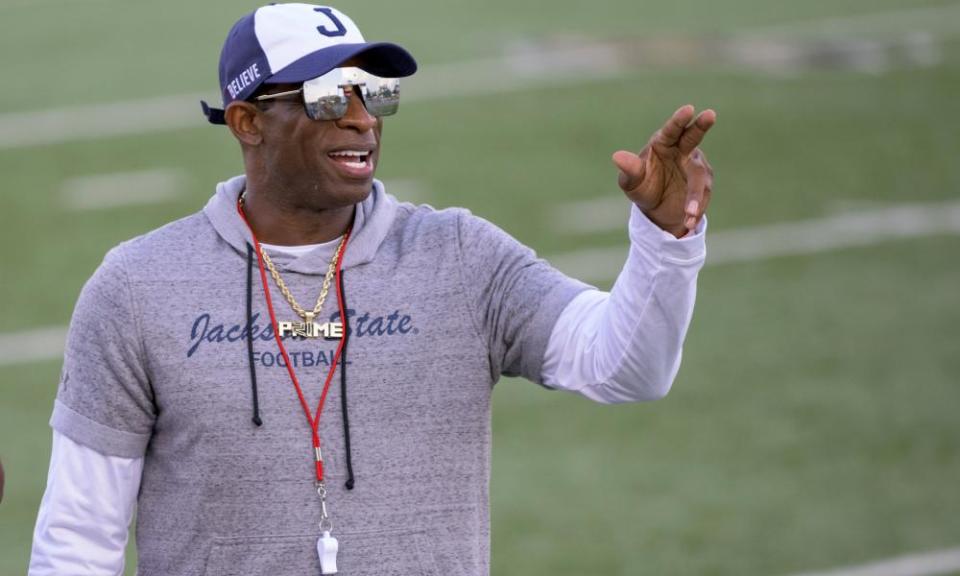Could Deion Sanders tip college football’s power balance toward Black schools?

Deion Sanders is the ultimate jack of all trades. As a college athlete at Florida State he starred at football, baseball and track. Selected fifth in the 1989 NFL draft Sanders instantly proved a triple threat as a cornerback, special teams returner and situational wide receiver. When he wasn’t dazzling on the gridiron he wowed Major League Baseball as a bag-swiping outfielder, becoming the only player to appear in a World Series and Super Bowl. Throughout Neon Deion crackled with charisma and swagger – delighting the masses with his brash fashions, touchdown dances and gift of the gab. In retirement he continued to enthrall as a television analyst, preacher and reality TV star.
Still: when the football hall of famer decided to try his hand at coaching football, it felt like a gig too far. Although he gathered some experience at the high school level in Texas, Sanders looked ill-prepared to make the jump to Jackson State – a south-central Mississippi outpost at quite a remove from the spotlight. A historically black college (or HBCU), Jackson State competes in the shadow of the Alabamas and Michigans of the land and operates under an anemic athletic budget. Sanders’s bold move looked like a bored celebrity trying his hand at coaching and threatened to go down like his attempt to run a charter school, an abject failure.
But in less than a year Sanders has established himself as a whiz at this job, too. This fall he led the 11-win Tigers to their first conference title in 14 years, and was named as one of the nation’s best college football coaches. On Saturday the Tigers play South Carolina State in the Celebration Bowl — the de facto championship game for HBCUs. His son Shedeur, the Tigers’ star quarterback, was recognized as one of the nation’s best freshmen. All the while the Tigers broke attendance records, averaging more than 42,000 spectators.
The star power of Coach Prime – that’s his name; don’t leave out the “coach” part – has turned out to be an effective lure for top-shelf talent. On Wednesday he shocked college football by signing Travis Hunter, the nation’s top-rated high school prospect. A multi-talented player in the Sanders mold, Hunter chose Jackson State after committing to Florida State, the college where Sanders made his name. Clips of Hunter’s dramatic commitment reveal were quickly followed by images of Florida State fans burning Sanders’s jersey. This wasn’t a one-off. This was a turning point.
This was the first year the NCAA allowed players to profit from their name, image and likeness. Sanders, a shrewd businessman who once ranked among pro sport’s highest earners, pledged to get his players paid as soon as the rule went into effect. At midnight on 1 July Tigers defensive tackle Antwan Owens was first to cash in. (Although Sanders has shot down speculation that the potential for endorsements is what put Hunter’s commitment over the top.)
This year also saw ESPN add historically black college games to its broadcast slate, a major coup for schools that held a monopoly on Black talent until the 1970s, when the best high-school players started to commit to well-funded programs where the student and staff body are overwhelmingly white. The tipping advantage has had coaches as well as players in the Black football community reconsidering HBCUs as a viable career path. Recently, former NFL head coach Hue Jackson and Heisman trophy winner Eddie George took jobs at Grambling and Tennessee State, respectively.
Where Sanders breaks from the herd is that he’s a bona fide celebrity, one who not only resonates with young athletes – and, unlike many coaches, enjoyed playing success at the very highest level – but meets them where they are. He has social media clout too; a few weeks ago Sanders opened his program to a buzzy Jackson State alum named Brittany Renner, an Instagram-famous model with a self-styled reputation for dating athletes for money rather than love. (A recent post-partum uncoupling from Charlotte Hornets forward PJ Washington has made her regular gossip blog fodder.) It’s difficult to imagine Nick Saban convening a similar clinic. On a recent episode of his podcast, 21 and Prime, Sanders said, “if I had her in my ear, if I had been sitting in that room at Florida State and had her come and lay it out like she laid it out, if I had I would be at least $20m richer.”
Still: for as much as Sanders is out there, the spotlight has a way of finding him – not the other way around. For all of his flash as a player, his work ethic and commitment to his craft were unassailable. When he decided to abandon his baseball career to focus on the NFL, he swung the fortunes of the San Francisco 49ers and Dallas Cowboys, helping them to Super Bowl victories. At the ebb of his career in Washington and Baltimore, Sanders was a celebrated mentor.
At Jackson State, Sanders gives lie to the idea that coaches can either win the press conference or win the locker room. Not surprisingly, the ease with which Sanders has found success has led to considerable speculation about his future. He has reportedly interviewed for multiple jobs with teams from the Power Five, the elite level of college football. The longer he stays in Jackson, it seems, the more likely his rivals will be circling to halt his progress by any means necessary, not least uncovering potential NCAA violations.
For the moment Coach Prime is firmly in his element. Who knew he’d be a master of this one.

 Yahoo Finance
Yahoo Finance 